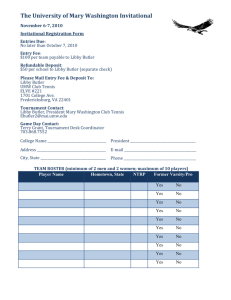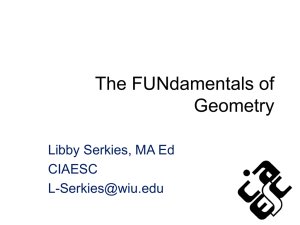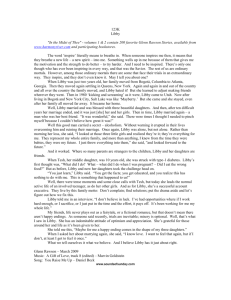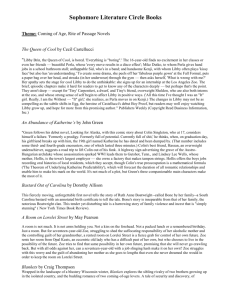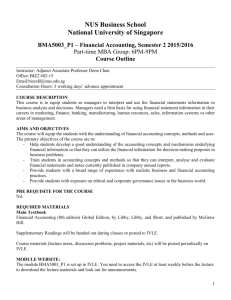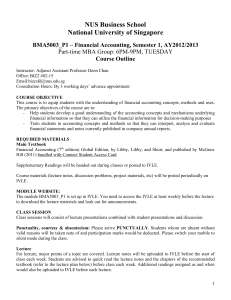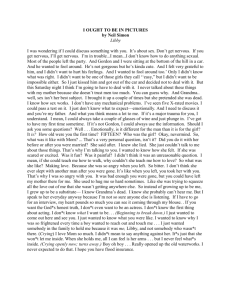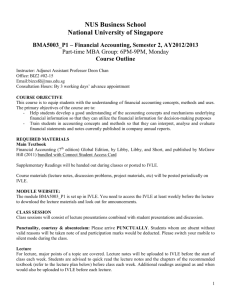UNITED STATES DISTRICT COURT FOR THE DISTRICT OF
advertisement
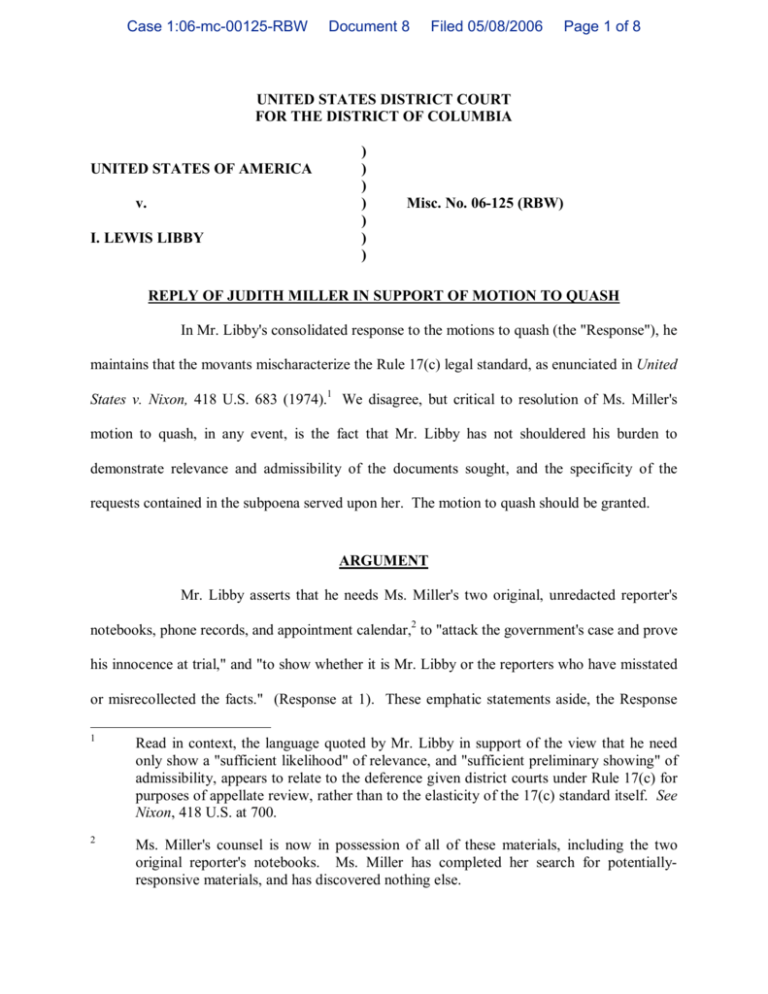
Case 1:06-mc-00125-RBW Document 8 Filed 05/08/2006 Page 1 of 8 UNITED STATES DISTRICT COURT FOR THE DISTRICT OF COLUMBIA UNITED STATES OF AMERICA v. I. LEWIS LIBBY ) ) ) ) ) ) ) Misc. No. 06-125 (RBW) REPLY OF JUDITH MILLER IN SUPPORT OF MOTION TO QUASH In Mr. Libby's consolidated response to the motions to quash (the "Response"), he maintains that the movants mischaracterize the Rule 17(c) legal standard, as enunciated in United States v. Nixon, 418 U.S. 683 (1974).1 We disagree, but critical to resolution of Ms. Miller's motion to quash, in any event, is the fact that Mr. Libby has not shouldered his burden to demonstrate relevance and admissibility of the documents sought, and the specificity of the requests contained in the subpoena served upon her. The motion to quash should be granted. ARGUMENT Mr. Libby asserts that he needs Ms. Miller's two original, unredacted reporter's notebooks, phone records, and appointment calendar,2 to "attack the government's case and prove his innocence at trial," and "to show whether it is Mr. Libby or the reporters who have misstated or misrecollected the facts." (Response at 1). These emphatic statements aside, the Response 1 Read in context, the language quoted by Mr. Libby in support of the view that he need only show a "sufficient likelihood" of relevance, and "sufficient preliminary showing" of admissibility, appears to relate to the deference given district courts under Rule 17(c) for purposes of appellate review, rather than to the elasticity of the 17(c) standard itself. See Nixon, 418 U.S. at 700. 2 Ms. Miller's counsel is now in possession of all of these materials, including the two original reporter's notebooks. Ms. Miller has completed her search for potentiallyresponsive materials, and has discovered nothing else. Case 1:06-mc-00125-RBW Document 8 Filed 05/08/2006 Page 2 of 8 offers the Court nothing tangible to establish that the documents sought from Ms. Miller contain any evidentiary material "relevant to the offenses charged in the indictment." Nixon, 418 U.S. at 700. By any reasonable interpretation, the requests present this Court with a classic "fishing expedition" not permitted by Rule 17(c).3 I. Review of Documents by Mr. Libby's Counsel, to Establish Relevancy and Admissibility, Is Not The Answer.__ ________________________________________ Taking on the contention in the motion to quash, supported by Mr. Bennett's declaration, that none of the documents sought by the defense are relevant to the case or admissible, Mr. Libby maintains that it is his counsel who "are in the best position to make [the] important judgments" with respect to the relevance and admissibility of the documents he seeks. (Response at 12). Mr. Libby further asserts that he "is clearly better situated than Ms. Miller's counsel to determine which individuals [referenced in her notes, phone logs and calendar] are 'pertinent to this case' and what 'context' is useful to the defense." (Response at 14). Mr. Libby cites no law in support of this proposition which, if implemented, would serve to grant defense counsel unchecked leeway to inspect any documents they seek via Rule 17(c). This cannot be the law, as it is not the purpose of Rule 17(c) to serve as a broad discovery device. See, e.g., United States v. Cuthbertson, 630 F.2d 139, 146 (3rd Cir. 1980). Given this black-letter law, there is simply no reason to reject Mr. Bennett's declaration as definitive –especially when Mr. Libby concedes he has no evidence to counter Mr. Bennett's representations. (Response at 11). The fact is that Ms. Miller's counsel has spent 3 Mr. Libby claims that "Movants admit" they have "[d]ocuments showing that [he] and other officials talked to reporters about Mr. Wilson . . . but never mentioned his wife . . . ." (Response at 7). Ms. Miller has made no such admission, and has not located any such documents. 2 Case 1:06-mc-00125-RBW Document 8 Filed 05/08/2006 Page 3 of 8 considerable time with her, reviewing the words, symbols, and notations in the two reporter's notebooks at issue. 4 To the extent the Court wishes to satisfy itself independently, in camera review is the answer, not production to the defense. United States v. Poindexter, 732 F. Supp. 135, 138, 141 (D.D.C. 1990).5 II. The Documents Sought Are Irrelevant to Any Defense and Are Inadmissible. Mr. Libby asserts that he "has established a 'sufficient likelihood' that the documents he seeks are relevant to his defense." (Response at 6). In support, he maintains that "the documents sought are likely to contain evidence that some, if not all, of his testimony about . . . conversations [with reporters] was correct and that it is the reporters who have an unreliable recollection or have misstated the facts." Id. He also makes the startlingly baseless claim that it may have been Ms. Miller who mentioned Ms. Plame to him. (Response at 15). These contentions are unavailing. How can it possibly be maintained that Ms. Miller's notes of discussions with persons other than Mr. Libby, regarding topics unrelated to the instant case, have any bearing on his, hers, or anyone's recollection of the salient facts regarding her 4 Ms. Miller and her counsel reviewed every page of her notes, not just the passages produced to the government as Mr. Libby suggests. (Response at 14 n.3; see Bennett Decl. at ¶¶ 4-7). 5 Notably, Mr. Libby does not seek in camera review. Mr. Libby asserts that he needs Ms. Miller's unredacted notes, eight months before trial, for impeachment. (Response at 11). The material he seeks, as it is completely irrelevant to the issues in the case, would not constitute proper impeachment evidence –particularly at this early date. See, e.g., Nixon, 418 U.S. at 701. Mr. Libby also contends, citing Nixon, that "'analysis and possible transcription' of much of the evidence sought (including reporters' notes) 'may take a significant period of time.'" (Response at 9, quoting Nixon). Nixon involved transcription of twenty lengthy audio tapes. 418 U.S. at 688. There is, by no stretch, anything close to this volume of material in Ms. Miller's possession. 3 Case 1:06-mc-00125-RBW Document 8 Filed 05/08/2006 Page 4 of 8 conversations with him? Nor does Mr. Libby successfully show the relevance of Ms. Miller's phone records and appointment calendar, which contain numerous references to both personal and professional contacts regarding topics unrelated to any issue germane to the instant matter. It is simply not the case that, as Mr. Libby claims, "the documents sought likely contain evidence that the government's witnesses are mistaken about . . . alleged conversations [among Mr. Libby and others], or are shading their testimony to protect themselves or others." (Response at 6).6 With respect to the notebooks, Mr. Libby argues that the unredacted "page" on which Mr. Wilson's phone number appears may assist the defense in determining from where Ms. Miller received the information. (Response at 13). Mr. Libby makes similar speculative arguments with respect to other entries. (Response at 13-14). Yet description of what Mr. Libby might be able to glean from the notebooks, and how he might then be able to investigate further, does not establish what he must to survive a motion to quash –that the evidence sought, in and of itself, is relevant and admissible. It is not, and no amount of hypothesizing about what Mr. Libby might learn from reviewing personal and sensitive professional information having nothing to do with this case will make it so.7 6 Also, as we point out in our opening brief and which Mr. Libby does not contest, his requests are precluded by the Court's prior ruling that such information is immaterial to any claim of defense. (Mem. Op. of March 10, 2006 at n.3). The prior ruling constitutes the law of this case. 7 Mr. Libby suggests that he will use such information "combined with information already known to the defense" to allow him to "identify who, other than Mr. Libby, may have disclosed Ms. Wilson's CIA affiliation to Ms. Miller . . . ." (Response at 14-15, emphasis added). Mr. Libby further maintains he will use such information "to contend that, contrary to the allegations in the indictment, it was Ms. Miller who raised this topic in her discussions with Mr. Libby –if the topic was raised at all." (Response at 15, emphasis in original). To the extent Mr. Libby has specific information establishing the information he demands is relevant and admissible, it is incumbent upon him to present it to the Court now, in support of his subpoena. He makes no such attempt. 4 Case 1:06-mc-00125-RBW III. Document 8 Filed 05/08/2006 Page 5 of 8 The Subpoena is Insufficiently Specific In Its Requests. Mr. Libby maintains that his Rule 17(c) subpoenas are properly limited by "date ranges, probable custodians, particular events, and narrowly circumscribed subject areas." 8 (Response at 9-10). This mischaracterizes the subpoena served upon Ms. Miller. With respect to Requests 1 and 2 –covering her notebooks, calendar and phone logs –the subpoena makes no reference to subject matter. And with respect to Request 2, encompassing her phone logs and calendar, the request covers a period of almost six weeks.9 Mr. Libby attempts to draw support from Nixon, but Nixon presented facts clearly distinguishable from the instant situation. In Nixon, the Court found the subpoena sufficiently specific, in part, because the subpoena sought "writings relating to certain precisely identified meetings between the President [the target of the subpoena] and others" and because "the Special Prosecutor was able to fix the time, place and persons present at these discussions" based on Mr. Libby also asserts that he needs the original notebooks to inspect the "coloration of the writing implement" and "weight of the markings." (Response at 13). Regarding color, Ms. Miller has produced a photo quality, color copy of the relevant portions of her notes to the grand jury. We assume a similar copy can be provided to Mr. Libby by the Special Counsel. His reference to "weight of the markings" is opaque, and is supported by no expert proffer as to relevance and admissibility. 8 In an attempt to distinguish the instant case from the subpoena quashed in United States v. Morris, 287 F.3d 985 (10th Cir. 2002), Mr. Libby maintains his subpoenas do not seek "entire files." However, Ms. Miller's notebooks are essentially "entire files," containing all interviews that took place over several weeks. Similarly, her phone logs and calendar are essentially "entire files," containing her appointments and contacts over a similar period of time. As noted, Mr. Libby's demand for these items is not limited by subject matter. Nor do they contain any material relevant to the case, let alone to the defense. 9 As noted in Ms. Miller's opening brief, Requests 3 and 6 overlap with Request 1 with respect to her reporter's notebooks. Requests 3 and 6 are limited by subject matter, such that the only portion of her notes responsive to the Requests are those she produced to the grand jury. 5 Case 1:06-mc-00125-RBW Document 8 information already in his possession. Filed 05/08/2006 Page 6 of 8 418 U.S. at 688 (emphasis added). Despite his earnestness, Mr. Libby provides no such detail. CONCLUSION For the foregoing reasons and those stated in her opening brief, Ms. Miller respectfully requests that the Court grant her motion. Dated: May 8, 2006 Respectfully submitted, By: _______________/s/__________________ Robert S. Bennett (D.C. Bar No. 112987) Saul M. Pilchen (D.C. Bar No. 376107) N. Nathan Dimock (D.C. Bar No. 487743) SKADDEN, ARPS, SLATE, MEAGHER & FLOM, LLP 1440 New York Avenue, N.W. Washington, D.C. 20005 (202) 371-7000 Counsel for Judith Miller 6 Case 1:06-mc-00125-RBW Document 8 Filed 05/08/2006 Page 7 of 8 CERTIFICATE OF SERVICE I, N. Nathan Dimock hereby certify that a true and correct copy of the foregoing "Reply Of Judith Miller In Support Of Motion To Quash" was this 8th day of May, 2006, filed by and with the Court and served by causing a true and correct copy to be delivered by facsimile and by first-class mail, postage prepaid to the following: William H. Jeffress, Jr. Alex Joseph Bourelly Alexandra M. Walsh BAKER BOTTS, LLP The Warner Building 1299 Pennsylvania Avenue, N.W. Washington, DC 20004 Facsimile: 202-585-1087 Joseph A. Tate DECHERT LLP 2929 Arch Street, Cira Centre Philadelphia, PA 19104 Facsimile: 215-994-2222 Theodore V. Wells, Jr. James Lewis Brochin PAUL, WEISS, RIFKIND, WHARTON & GARRISON, LLP 1285 Avenue of the Americas New York, NY 10019 Facsimile: 212-373-2217 John DeWitt Cline JONES DAY 555 California Street San Francisco, CA 94104 Facsimile: 415-875-5700 Counsel for Defendant Case 1:06-mc-00125-RBW Document 8 Filed 05/08/2006 Page 8 of 8 Honorable Patrick J. Fitzgerald Special Counsel OFFICE OF THE UNITED STATES ATTORNEY NORTHERN DISTRICT OF ILLINOIS Dirksen Federal Building 219 South Dearborn St. Chicago IL 60604 Facsimile: 312 886-0657 Debra R. Bonamici OFFICE OF THE SPECIAL COUNSEL Dirksen Federal Building 219 South Dearborn St. Room 500 Chicago IL 60604 Facsimile: 312 886-0657 Kathleen Kedian Deputy Special Counsel U.S. DEPARTMENT OF JUSTICE 1400 New York Avenue, N.W., Room 9422 Washington, DC 20005 Facsimile: 202 514-3003 Peter Robert Zeidenberg U.S. DEPARTMENT OF JUSTICE 1400 New York Avenue, N.W., Room 12-405 Washington, DC 20005 Facsimile: 202 514-3003 Counsel for the United States ______________/s/_____________ N. Nathan Dimock SKADDEN, ARPS, SLATE, MEAGHER & FLOM, LLP 1440 New York Avenue, N.W. Washington, D.C. 20005 2
